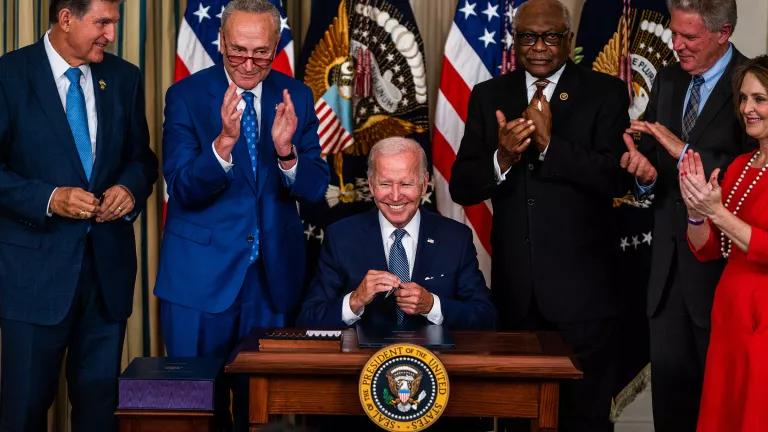Time for a New Federal Approach to Worker Health & Safety

The National Agenda for Worker Safety and Health is a roadmap for the administration and Congress to create a better life for America’s workers, their families, and their communities.
From day one, the Trump administration systematically jeopardized the safety, rights, and economic welfare of workers. Workplace protections were rolled back, agencies were threatened with funding cuts, and we saw repeated failures to address the coronavirus pandemic—leaving millions of America’s workers unprotected.
The Biden-Harris administration has ushered in a much-needed shift, taking several important steps to protect worker health and safety. From rescinding anti-union executive orders to directing the Occupational Safety and Health Administration (OSHA) to issue revised COVID-19 guidance for employers and increase enforcement efforts, the administration’s first steps will significantly benefit workers.
But these efforts are just that: first steps.
They must be the very beginning of a concerted effort to address not only the failures of the previous administration, but the health and safety issues workers have faced for decades.
That is why NRDC is standing with workers, unions, safety advocates, and worker organizations by endorsing the new National Agenda for Worker Safety and Health. Fully realized, the agenda would help workers and communities thrive despite the four “converging crises” facing the nation: COVID-19, economic security, climate change, and systemic racism.

Emerging from the COVID-19 Crisis
Weak U.S. labor protections left the nation unprepared to protect workers from the COVID-19 pandemic. Across many industries, essential workers are suffering tremendously.
The pandemic has highlighted key weaknesses in our health and safety system, which the Biden-Harris administration and Congress can address in part by:
- Focusing on fixing the work and not the worker. This requires thinking beyond personal protective equipment and prioritizing controls in the workplace, such as eliminating hazards altogether.
- Listening to and providing a seat at the decision-making table to workers, unions, and worker organizations, who know where the problems are and how to fix them.
- Improving on existing whistleblower protections and protect workers who identify unsafe conditions from retaliation.
Reducing the Bite of the Economic Crisis
The pandemic has forced the U.S. economy into crisis. The fallout of that crisis has left millions of workers under- and unemployed, struggling with food insecurity, and facing eviction and homelessness. In addition, many workers have been expected to work in unsafe conditions, forcing them to choose between their health and an income. More than ever, it is important for workers to have fair and just compensation. The Biden-Harris Administration and Congress should:
- Require employers to provide paid sick and family leave to all workers. Paid leave provisions allow workers who would not otherwise afford to stay home to take care of themselves and their families without fear of losing their jobs.
- Protect the rights of workers to collectively bargain for better wages, benefits, and working conditions. This includes passing the Protecting the Right to Organize (PRO) Act, which was advanced by the U.S. House of Representatives in early 2020.
Preparing for the Mounting Harms of the Climate Crisis
Climate change is already hurting workers, making existing workplace hazards worse—and creating new ones. To prepare workers for the health and safety effects of climate change, the Biden-Harris administration and Congress need to start by:
- Directing OSHA to establish an enforceable, science-based heat stress standard that protects both indoor and outdoor workers. Workers are already bearing the brunt of the heat and life-altering illnesses caused by it.
- Ensuring that the pollution reduction and climate adaptation jobs identified in President Biden’s “Climate Day” executive order are healthy, safe, and pay fair wages.
Protecting the Most Vulnerable by Tackling the Systemic Racism Crisis
COVID-19, the economic crisis, and impacts of climate change have been particularly felt among Black, Latino, Indigenous, and immigrant communities. Ensuring that the most vulnerable communities are protected is paramount. To end several of the underlying systemic causes of these inequities, the Biden-Harris administration and Congress must:
- Help end the use of residency status as a retaliatory mechanism. It should be unlawful for employers to penalize or discriminate against employees due to their immigration status, particularly for workers who report wage or safety violations.
- Ensure that domestic, temporary, gig-economy, agriculture, and other misclassified and precarious workers are not falling through the cracks of federal labor protections.
- Track health and safety data by race and ethnicity and make the data transparent and accessible.

While President Biden can make many of these and the other items in the National Agenda happen with existing authority, Congress will also need to get involved.
For example, OSHA will have difficulty meeting President Biden’s directives to increase enforcement without additional resources. Congress needs to provide more funding to OSHA for staffing, enforcement, outreach and collaboration, and training grants that focus on community-based worker organizations and unions.
It is time to stop treating workers like they are disposable. With a bold and ambitious new approach, the new administration and Congress can save the lives of individual workers and improve the lives of their families and neighbors.The National Agenda for Worker Safety and Health is such an approach—one informed by the experience of workers who aren’t afraid to roll up their sleeves and get things done.



